Analysis of Skills Required to Manage GERD Project Complexities
VerifiedAdded on 2022/08/23
|6
|1342
|17
Report
AI Summary
This report examines the complexities encountered in the GERD project, identifying four key skill areas necessary for effective management: good vision for structural complexities, technical expertise for technical complexities, planning and risk management for temporal complexities, and administrative skills for directional complexities. The report emphasizes the importance of acquiring these skills at the appropriate level, utilizing the Dreyfus model of skill acquisition to determine the proficiency required for each. The analysis concludes that proficient-level skills are essential for managing the technical and structural complexities, while an expert level is needed for directional complexities. The report underscores the need for managers to possess a high degree of skill to effectively address the challenges and ensure project success. The novice and competent levels are deemed insufficient for handling the project's intricacies.

PROJECT MANAGEMENT
Paraphrase This Document
Need a fresh take? Get an instant paraphrase of this document with our AI Paraphraser
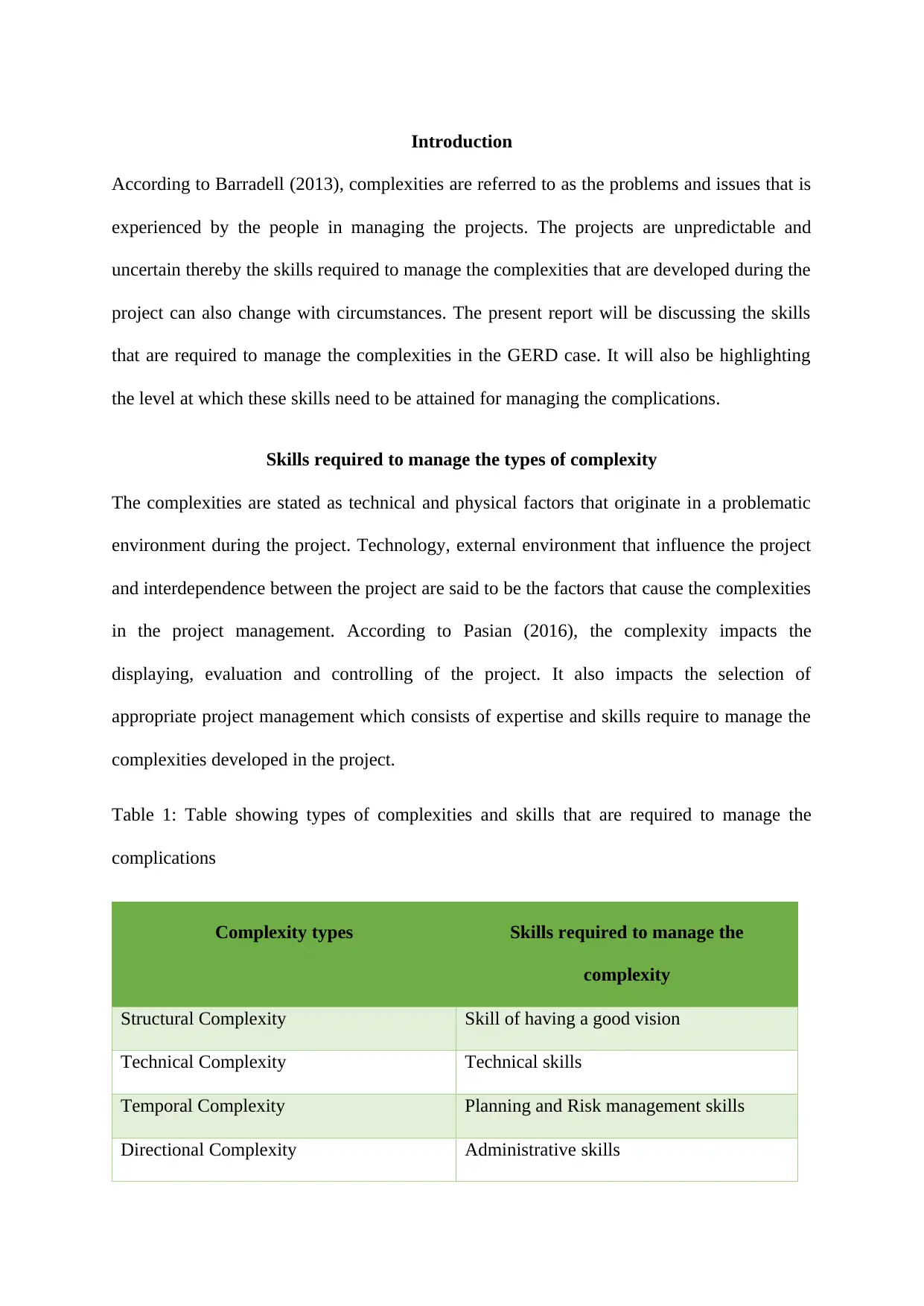
Introduction
According to Barradell (2013), complexities are referred to as the problems and issues that is
experienced by the people in managing the projects. The projects are unpredictable and
uncertain thereby the skills required to manage the complexities that are developed during the
project can also change with circumstances. The present report will be discussing the skills
that are required to manage the complexities in the GERD case. It will also be highlighting
the level at which these skills need to be attained for managing the complications.
Skills required to manage the types of complexity
The complexities are stated as technical and physical factors that originate in a problematic
environment during the project. Technology, external environment that influence the project
and interdependence between the project are said to be the factors that cause the complexities
in the project management. According to Pasian (2016), the complexity impacts the
displaying, evaluation and controlling of the project. It also impacts the selection of
appropriate project management which consists of expertise and skills require to manage the
complexities developed in the project.
Table 1: Table showing types of complexities and skills that are required to manage the
complications
Complexity types Skills required to manage the
complexity
Structural Complexity Skill of having a good vision
Technical Complexity Technical skills
Temporal Complexity Planning and Risk management skills
Directional Complexity Administrative skills
According to Barradell (2013), complexities are referred to as the problems and issues that is
experienced by the people in managing the projects. The projects are unpredictable and
uncertain thereby the skills required to manage the complexities that are developed during the
project can also change with circumstances. The present report will be discussing the skills
that are required to manage the complexities in the GERD case. It will also be highlighting
the level at which these skills need to be attained for managing the complications.
Skills required to manage the types of complexity
The complexities are stated as technical and physical factors that originate in a problematic
environment during the project. Technology, external environment that influence the project
and interdependence between the project are said to be the factors that cause the complexities
in the project management. According to Pasian (2016), the complexity impacts the
displaying, evaluation and controlling of the project. It also impacts the selection of
appropriate project management which consists of expertise and skills require to manage the
complexities developed in the project.
Table 1: Table showing types of complexities and skills that are required to manage the
complications
Complexity types Skills required to manage the
complexity
Structural Complexity Skill of having a good vision
Technical Complexity Technical skills
Temporal Complexity Planning and Risk management skills
Directional Complexity Administrative skills
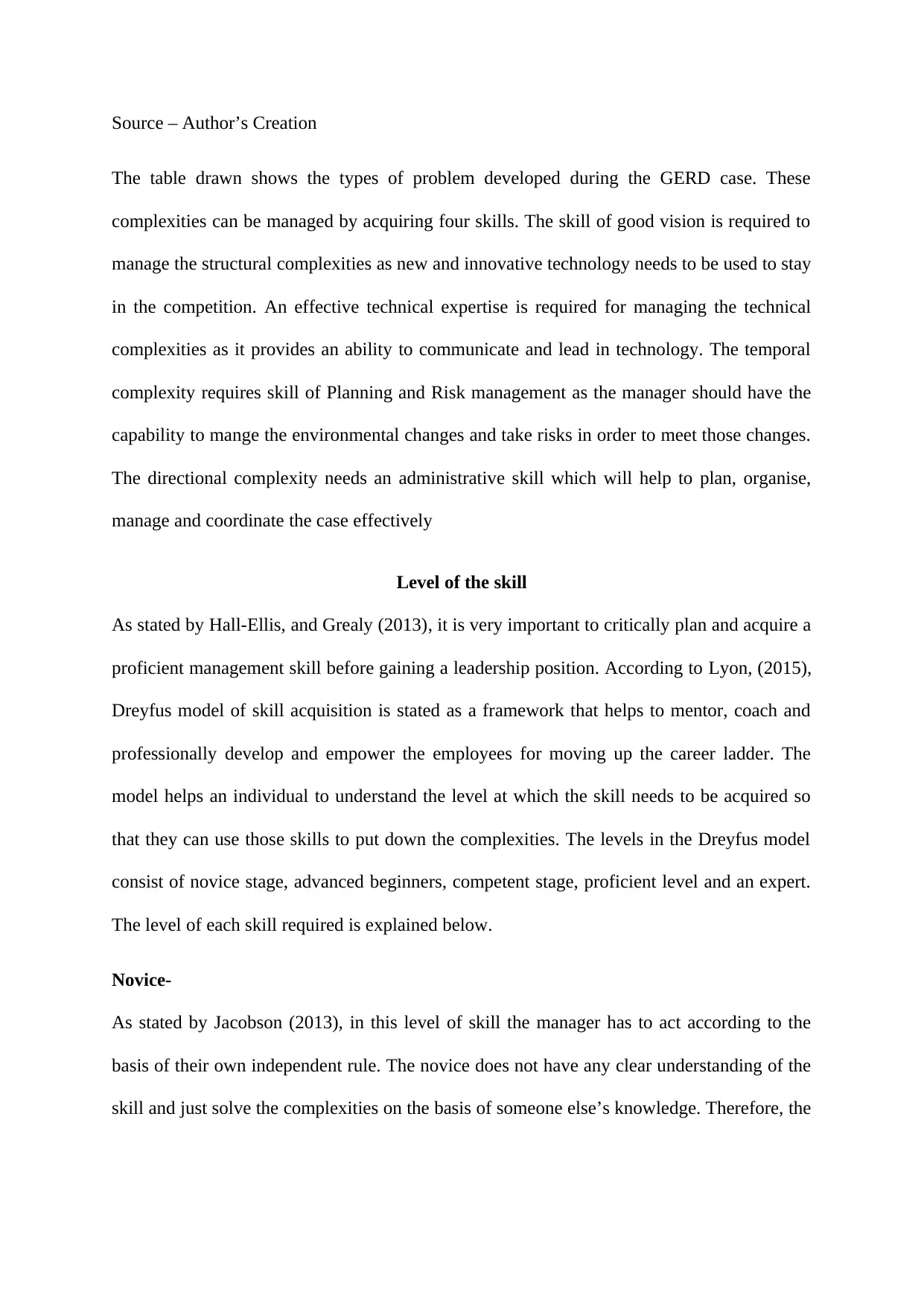
Source – Author’s Creation
The table drawn shows the types of problem developed during the GERD case. These
complexities can be managed by acquiring four skills. The skill of good vision is required to
manage the structural complexities as new and innovative technology needs to be used to stay
in the competition. An effective technical expertise is required for managing the technical
complexities as it provides an ability to communicate and lead in technology. The temporal
complexity requires skill of Planning and Risk management as the manager should have the
capability to mange the environmental changes and take risks in order to meet those changes.
The directional complexity needs an administrative skill which will help to plan, organise,
manage and coordinate the case effectively
Level of the skill
As stated by Hall-Ellis, and Grealy (2013), it is very important to critically plan and acquire a
proficient management skill before gaining a leadership position. According to Lyon, (2015),
Dreyfus model of skill acquisition is stated as a framework that helps to mentor, coach and
professionally develop and empower the employees for moving up the career ladder. The
model helps an individual to understand the level at which the skill needs to be acquired so
that they can use those skills to put down the complexities. The levels in the Dreyfus model
consist of novice stage, advanced beginners, competent stage, proficient level and an expert.
The level of each skill required is explained below.
Novice-
As stated by Jacobson (2013), in this level of skill the manager has to act according to the
basis of their own independent rule. The novice does not have any clear understanding of the
skill and just solve the complexities on the basis of someone else’s knowledge. Therefore, the
The table drawn shows the types of problem developed during the GERD case. These
complexities can be managed by acquiring four skills. The skill of good vision is required to
manage the structural complexities as new and innovative technology needs to be used to stay
in the competition. An effective technical expertise is required for managing the technical
complexities as it provides an ability to communicate and lead in technology. The temporal
complexity requires skill of Planning and Risk management as the manager should have the
capability to mange the environmental changes and take risks in order to meet those changes.
The directional complexity needs an administrative skill which will help to plan, organise,
manage and coordinate the case effectively
Level of the skill
As stated by Hall-Ellis, and Grealy (2013), it is very important to critically plan and acquire a
proficient management skill before gaining a leadership position. According to Lyon, (2015),
Dreyfus model of skill acquisition is stated as a framework that helps to mentor, coach and
professionally develop and empower the employees for moving up the career ladder. The
model helps an individual to understand the level at which the skill needs to be acquired so
that they can use those skills to put down the complexities. The levels in the Dreyfus model
consist of novice stage, advanced beginners, competent stage, proficient level and an expert.
The level of each skill required is explained below.
Novice-
As stated by Jacobson (2013), in this level of skill the manager has to act according to the
basis of their own independent rule. The novice does not have any clear understanding of the
skill and just solve the complexities on the basis of someone else’s knowledge. Therefore, the
⊘ This is a preview!⊘
Do you want full access?
Subscribe today to unlock all pages.

Trusted by 1+ million students worldwide
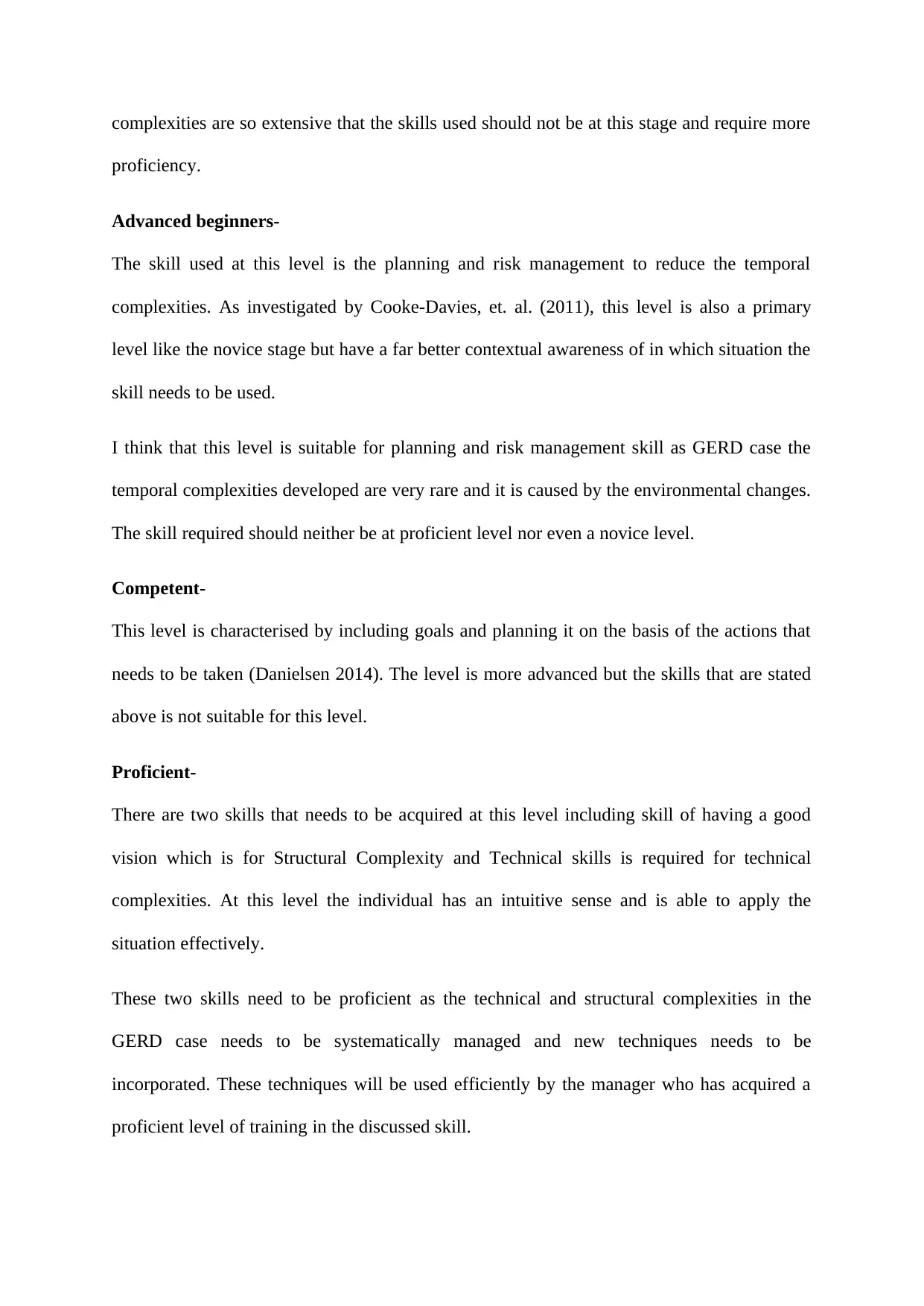
complexities are so extensive that the skills used should not be at this stage and require more
proficiency.
Advanced beginners-
The skill used at this level is the planning and risk management to reduce the temporal
complexities. As investigated by Cooke-Davies, et. al. (2011), this level is also a primary
level like the novice stage but have a far better contextual awareness of in which situation the
skill needs to be used.
I think that this level is suitable for planning and risk management skill as GERD case the
temporal complexities developed are very rare and it is caused by the environmental changes.
The skill required should neither be at proficient level nor even a novice level.
Competent-
This level is characterised by including goals and planning it on the basis of the actions that
needs to be taken (Danielsen 2014). The level is more advanced but the skills that are stated
above is not suitable for this level.
Proficient-
There are two skills that needs to be acquired at this level including skill of having a good
vision which is for Structural Complexity and Technical skills is required for technical
complexities. At this level the individual has an intuitive sense and is able to apply the
situation effectively.
These two skills need to be proficient as the technical and structural complexities in the
GERD case needs to be systematically managed and new techniques needs to be
incorporated. These techniques will be used efficiently by the manager who has acquired a
proficient level of training in the discussed skill.
proficiency.
Advanced beginners-
The skill used at this level is the planning and risk management to reduce the temporal
complexities. As investigated by Cooke-Davies, et. al. (2011), this level is also a primary
level like the novice stage but have a far better contextual awareness of in which situation the
skill needs to be used.
I think that this level is suitable for planning and risk management skill as GERD case the
temporal complexities developed are very rare and it is caused by the environmental changes.
The skill required should neither be at proficient level nor even a novice level.
Competent-
This level is characterised by including goals and planning it on the basis of the actions that
needs to be taken (Danielsen 2014). The level is more advanced but the skills that are stated
above is not suitable for this level.
Proficient-
There are two skills that needs to be acquired at this level including skill of having a good
vision which is for Structural Complexity and Technical skills is required for technical
complexities. At this level the individual has an intuitive sense and is able to apply the
situation effectively.
These two skills need to be proficient as the technical and structural complexities in the
GERD case needs to be systematically managed and new techniques needs to be
incorporated. These techniques will be used efficiently by the manager who has acquired a
proficient level of training in the discussed skill.
Paraphrase This Document
Need a fresh take? Get an instant paraphrase of this document with our AI Paraphraser
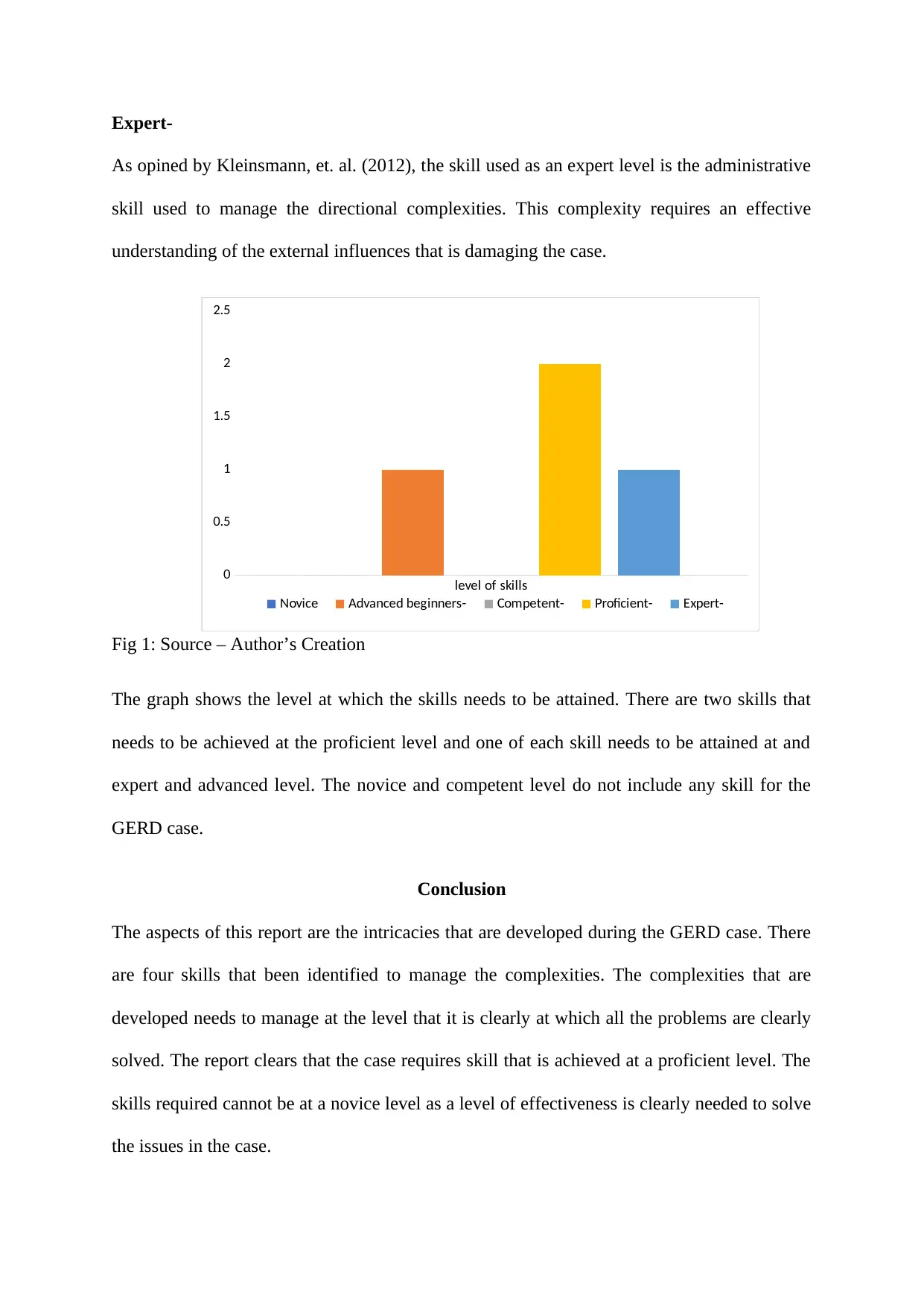
Expert-
As opined by Kleinsmann, et. al. (2012), the skill used as an expert level is the administrative
skill used to manage the directional complexities. This complexity requires an effective
understanding of the external influences that is damaging the case.
Fig 1: Source – Author’s Creation
The graph shows the level at which the skills needs to be attained. There are two skills that
needs to be achieved at the proficient level and one of each skill needs to be attained at and
expert and advanced level. The novice and competent level do not include any skill for the
GERD case.
Conclusion
The aspects of this report are the intricacies that are developed during the GERD case. There
are four skills that been identified to manage the complexities. The complexities that are
developed needs to manage at the level that it is clearly at which all the problems are clearly
solved. The report clears that the case requires skill that is achieved at a proficient level. The
skills required cannot be at a novice level as a level of effectiveness is clearly needed to solve
the issues in the case.
level of skills
0
0.5
1
1.5
2
2.5
Novice Advanced beginners- Competent- Proficient- Expert-
As opined by Kleinsmann, et. al. (2012), the skill used as an expert level is the administrative
skill used to manage the directional complexities. This complexity requires an effective
understanding of the external influences that is damaging the case.
Fig 1: Source – Author’s Creation
The graph shows the level at which the skills needs to be attained. There are two skills that
needs to be achieved at the proficient level and one of each skill needs to be attained at and
expert and advanced level. The novice and competent level do not include any skill for the
GERD case.
Conclusion
The aspects of this report are the intricacies that are developed during the GERD case. There
are four skills that been identified to manage the complexities. The complexities that are
developed needs to manage at the level that it is clearly at which all the problems are clearly
solved. The report clears that the case requires skill that is achieved at a proficient level. The
skills required cannot be at a novice level as a level of effectiveness is clearly needed to solve
the issues in the case.
level of skills
0
0.5
1
1.5
2
2.5
Novice Advanced beginners- Competent- Proficient- Expert-
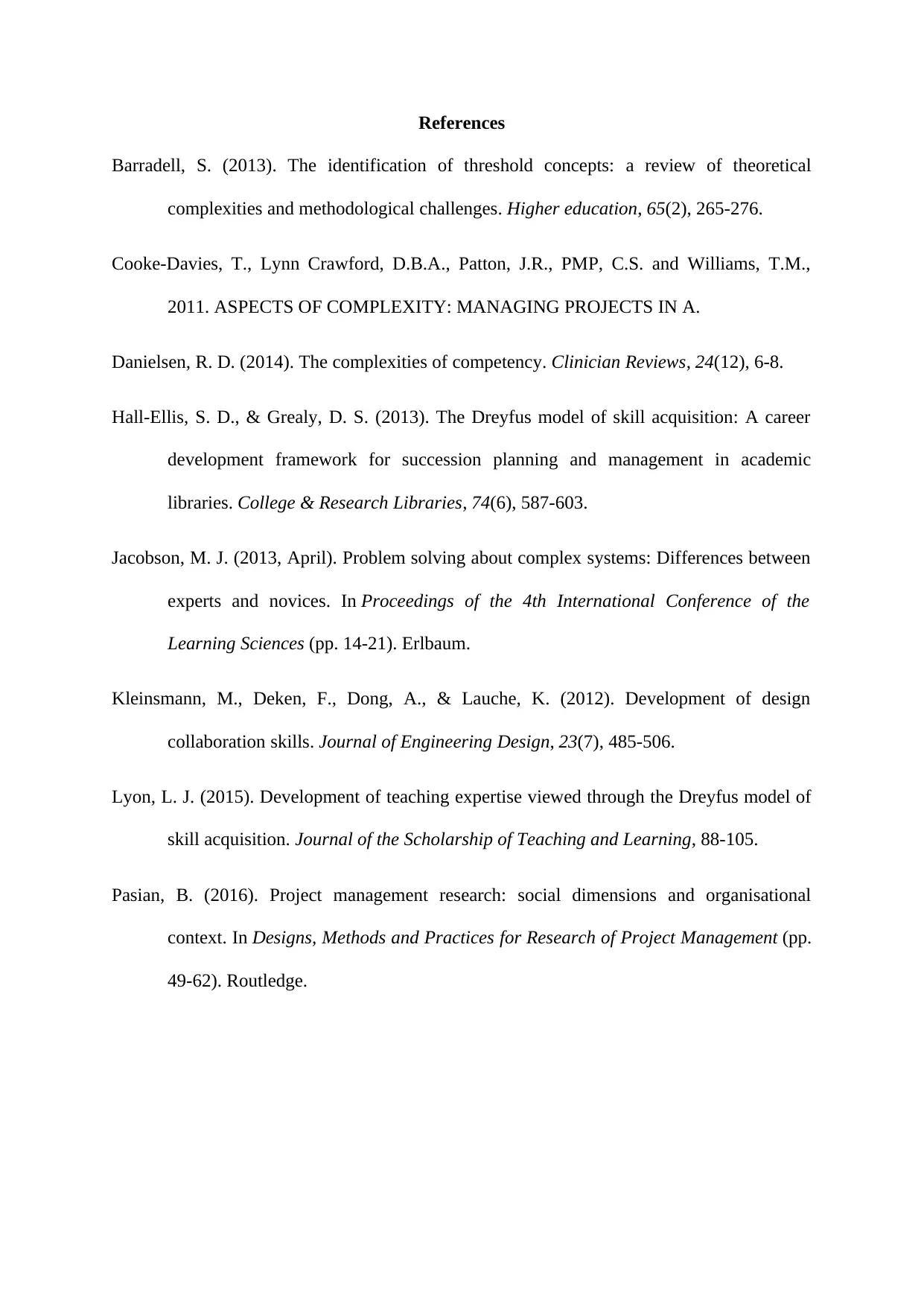
References
Barradell, S. (2013). The identification of threshold concepts: a review of theoretical
complexities and methodological challenges. Higher education, 65(2), 265-276.
Cooke-Davies, T., Lynn Crawford, D.B.A., Patton, J.R., PMP, C.S. and Williams, T.M.,
2011. ASPECTS OF COMPLEXITY: MANAGING PROJECTS IN A.
Danielsen, R. D. (2014). The complexities of competency. Clinician Reviews, 24(12), 6-8.
Hall-Ellis, S. D., & Grealy, D. S. (2013). The Dreyfus model of skill acquisition: A career
development framework for succession planning and management in academic
libraries. College & Research Libraries, 74(6), 587-603.
Jacobson, M. J. (2013, April). Problem solving about complex systems: Differences between
experts and novices. In Proceedings of the 4th International Conference of the
Learning Sciences (pp. 14-21). Erlbaum.
Kleinsmann, M., Deken, F., Dong, A., & Lauche, K. (2012). Development of design
collaboration skills. Journal of Engineering Design, 23(7), 485-506.
Lyon, L. J. (2015). Development of teaching expertise viewed through the Dreyfus model of
skill acquisition. Journal of the Scholarship of Teaching and Learning, 88-105.
Pasian, B. (2016). Project management research: social dimensions and organisational
context. In Designs, Methods and Practices for Research of Project Management (pp.
49-62). Routledge.
Barradell, S. (2013). The identification of threshold concepts: a review of theoretical
complexities and methodological challenges. Higher education, 65(2), 265-276.
Cooke-Davies, T., Lynn Crawford, D.B.A., Patton, J.R., PMP, C.S. and Williams, T.M.,
2011. ASPECTS OF COMPLEXITY: MANAGING PROJECTS IN A.
Danielsen, R. D. (2014). The complexities of competency. Clinician Reviews, 24(12), 6-8.
Hall-Ellis, S. D., & Grealy, D. S. (2013). The Dreyfus model of skill acquisition: A career
development framework for succession planning and management in academic
libraries. College & Research Libraries, 74(6), 587-603.
Jacobson, M. J. (2013, April). Problem solving about complex systems: Differences between
experts and novices. In Proceedings of the 4th International Conference of the
Learning Sciences (pp. 14-21). Erlbaum.
Kleinsmann, M., Deken, F., Dong, A., & Lauche, K. (2012). Development of design
collaboration skills. Journal of Engineering Design, 23(7), 485-506.
Lyon, L. J. (2015). Development of teaching expertise viewed through the Dreyfus model of
skill acquisition. Journal of the Scholarship of Teaching and Learning, 88-105.
Pasian, B. (2016). Project management research: social dimensions and organisational
context. In Designs, Methods and Practices for Research of Project Management (pp.
49-62). Routledge.
⊘ This is a preview!⊘
Do you want full access?
Subscribe today to unlock all pages.

Trusted by 1+ million students worldwide
1 out of 6
Related Documents
Your All-in-One AI-Powered Toolkit for Academic Success.
+13062052269
info@desklib.com
Available 24*7 on WhatsApp / Email
![[object Object]](/_next/static/media/star-bottom.7253800d.svg)
Unlock your academic potential
Copyright © 2020–2026 A2Z Services. All Rights Reserved. Developed and managed by ZUCOL.





